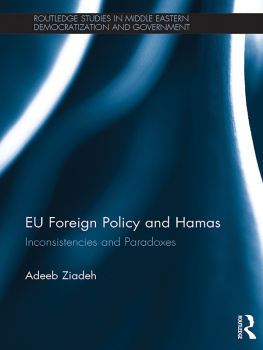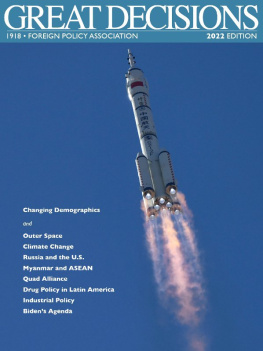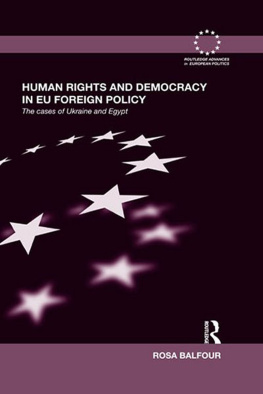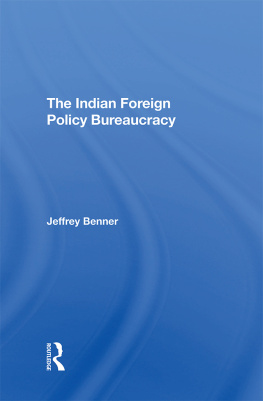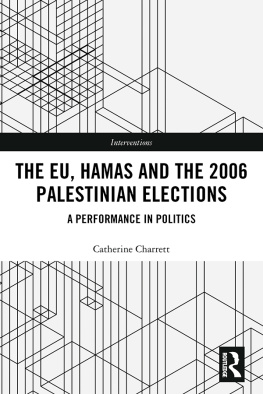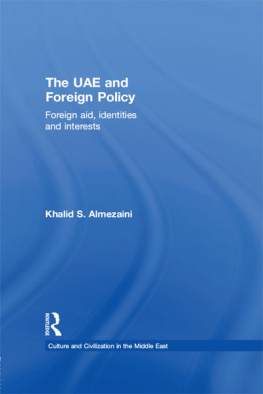EU Foreign Policy and Hamas
Shortly after the overwhelming victory of Hamas in the 2006 parliamentary and municipal elections, civil war broke out in the Gaza Strip between members of the two factions, Hamas and Fatah. The EU, along with the US, the UN and Russia, not only gave its support to Fatah against Hamas, but also imposed a tough siege on the Hamas government in an attempt to force it to accept the Middle East Quartets political conditions, described by Hamas leaders as unfair and impossible. Many observers are convinced that the EUs behaviour in this matter has been unreasonable and has conflicted with the EUs own democratic beliefs and values.
This book sheds light on the EUs policies in Palestine mainly from 200313, and provides a thorough examination of the inconsistencies and paradoxes in the EU discourse towards Hamas, and the determinants underlying such contradictions. It explores the reasons behind the EU labelling Hamas a terrorist organization and discusses why the EU has boycotted its democratically elected body since 2006. Significantly, the book looks at whether the EU jeopardized its reputation and contravened its core normative values and objectives (democracy promotion, human rights, the rule of law and fundamental freedoms) by such a categorization of Hamas.
Exploring the EUs policy towards Hamas is vital for understanding how the relationship between the EU and other Islamist groupings in the Middle East is perceived, as it enables both sides to have a cognitive basis upon which to construct better relations. This book, based upon a vast spread of primary EU documents and interviews, will therefore be a valuable resource for those studying the Arab-Israeli conflict, political Islamic movements, the Middle East peace process, and anyone with an interest in EU foreign policy.
Adeeb Ziadeh is an independent researcher and consultant in European-Middle Eastern politics who received his PhD in politics from the University of Exeter. His areas of interest include EU foreign and domestic affairs, political Islam, terrorism and resistance.
Routledge Studies in Middle Eastern Democratization and Government
Edited by:
Larbi Sadiki, Qatar University
This series examines new ways of understanding democratization and government in the Middle East. The varied and uneven processes of change, occurring in the Middle Eastern region, can no longer be read and interpreted solely through the prism of Euro-American transitology. Seeking to frame critical parameters in light of these new horizons, this series instigates reinterpretations of democracy and propagates formerly subaltern, narratives of democratization. Reinvigorating discussion on how Arab and Middle Eastern peoples and societies seek good government, Routledge Studies in Middle Eastern Democratization and Government provides tests and contests of old and new assumptions.
For a full list of titles in the series: https://www.routledge.com/middleeaststudies/series/RSMEDG
Egyptians in Revolt
The Political Economy of Worker and Student Mobilizations 19192011
Adel Abdel Ghafar
US Hard Power in the Arab World
Resistance, the Syrian Uprising and the War on Terror
Layla Saleh
Palestine in EU and Russian Foreign Policy
Statehood and the Peace Process
Malath Alagha
Tunisias International Relations since the Arab Spring
Transition Inside and Out
Edited by Tasnim Abderrahim, Laura-Theresa Krger, Salma Besbes and Katharina McLarren
EU Foreign Policy and Hamas
Inconsistencies and Paradoxes
Adeeb Ziadeh
EU Foreign Policy and Hamas
Inconsistencies and Paradoxes
Adeeb Ziadeh
First published 2018
by Routledge
2 Park Square, Milton Park, Abingdon, Oxon, OX14 4RN
and by Routledge
711 Third Avenue, New York, NY 10017
Routledge is an imprint of the Taylor & Francis Group, an informa business
2018 Adeeb Ziadeh
The right of Adeeb Ziadeh to be identified as the author of this work has been asserted by him in accordance with sections 77 and 78 of the Copyright, Designs and Patents Act 1988.
All rights reserved. No part of this book may be reprinted or reproduced or utilised in any form or by any electronic, mechanical, or other means, now known or hereafter invented, including photocopying and recording, or in any information storage or retrieval system, without permission in writing from the publishers.
Trademark notice: Product or corporate names may be trademarks or registered trademarks, and are used only for identification and explanation without intent to infringe.
British Library Cataloguing-in-Publication Data
A catalogue record for this book is available from the British Library
Library of Congress Cataloging in Publication Data
Names: Ziadeh, Adeeb, author.
Title: EU foreign policy and Hamas : inconsistencies and paradoxes / Adeeb Ziadeh.
Other titles: European Union foreign policy and Hamas | Routledge studies in Middle Eastern democratization and government ; 1.Description: Milton Park, Abingdon, Oxon : Routledge, 2018. | Series: Routledge studies in Middle Eastern democratization and government ; 1 | Includes bibliographical references and index.
Identifiers: LCCN 2017023977| ISBN 9781138040007 (hbk) | ISBN 9781315175508 (ebk)
Subjects: LCSH: Harakat al-Muqawamah al-Islamiyah. | Palestinian Arabs-Politics and government-1993- | European Union countries-Foreign relations-Gaza Strip. | Gaza Strip-Foreign relations-European Union countries.
Classification: LCC JQ1830.A98 H3794 2018 | DDC 341.242/20956943-dc23
LC record available at https://lccn.loc.gov/2017023977
ISBN: 978-1-138-04000-7 (hbk)
ISBN: 978-1-315-17550-8 (ebk)
Investigation of the European Union (EU)s foreign policy towards Hamas acquires its significance as a topic in the light of the undemocratic way in which the (supposedly) democratic EU pursues its strategy since, according to its own rhetoric, this should have been developed in accordance with democratic norms. In examining inconsistencies and paradoxes in the EU discourse towards Hamas, and the determinants underlying such contradictions, the study scrutinizes questions of how and why, focusing mainly on identities and self-interests as lenses borrowed from constructivism and neorealism, as well as the influence of external actors on the way in which the EU behaves towards Hamas.
Behind such inconsistency stands a long standing cultural-historical heritage, part of the mindset of the European decision-makers. The contradictory status of the association between the two actors is formed by the main interactively constructed and conflictual sociopolitical components arising from the reality of the EU as a stability-seeking and security-driven actor in Palestine, and the self-definition of Hamas as a freedom-fighter striving for the liberation of its lands. Two culturally derived ideas, one defended by the EU, that Palestine is a promised land for the Jews within a two-state solution, stands in contrast to that held by Hamas, that Palestine is an Islamic waqf, and therein lies further evidence of the identity clash between the two actors. The Israeli factor, regarded in practice as a fixed, constant and purely Western and European interest in the Middle East, along with the dominant influence of the US on its partner, the EU, are emphasized as the main determinants of EU policy towards Hamas.


